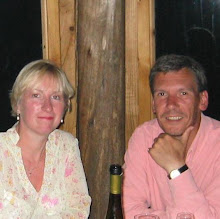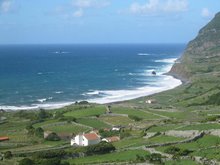As obrasprazotories (OPs) go, it's proving to be a bit of a frustrating one for the reason that it's proceeding very slowly - agony for those of us who suffer from premature obrasprazoturation.
It's not because of sloth or indolence on the part of the workmen - I'll rephrase that - the workman for it's just one guy doing this. Quite the contrary. The apparent lack of progress is because the job's being done so thoroughly. In particular, not only is the old paint being taken off with a blow torch but also large chunks of the plaster as well. I believe the position we're at just now is waiting for the new plaster to dry thoroughly before any new paint can be applied. Anyway, this is what it presently looks like with the all the old paint off (on the left).
 In the foreground, you'll note a phalanx of German tourists (is that the right collective noun for German tourists? Perhaps it should be a "korps" or a "bunker") striding with teutonic discipline through the village: they'll be at the gates of Krakow before you can say "Baden-Württemberg" (and they'd have advanced to the Urals by the time you could spell it). That chap on the right is clearly still smarting over the Sudetenland.
In the foreground, you'll note a phalanx of German tourists (is that the right collective noun for German tourists? Perhaps it should be a "korps" or a "bunker") striding with teutonic discipline through the village: they'll be at the gates of Krakow before you can say "Baden-Württemberg" (and they'd have advanced to the Urals by the time you could spell it). That chap on the right is clearly still smarting over the Sudetenland.
Anyway, as if to make up for lack of anything much to report on the shop/bar, I'm able to report the commencement of a new OP in the village. It's the external redecoration of a nice house down the road between us and the shop which has been looking decidedly scruffy for a while. This time it's a complete removal of all plaster job:-
And at this point, all work has stopped on this house. It may be that the stonework beneath the plaster has to breathe and dry out again but, whatever the reason, it's an excruciating case of obrasprazotorus interruptus.





4 comments:
I've met members of German hiking groups on two of my Azores trips, and have found them to be friendly and pleasant, not to mention fluent in English (don't know re the others in their parties on all these counts, but have no reason to suspect otherwise). They reported that they were all wowed by the Azores' unspoiled natural beauty, especially on the islands of Flores and São Jorge.
On my first trip I spent a day with three young German women staying at the same hotel on Pico, who were on the same whale/dolphin watching voyage as I, after which we ate lunch together on the patio of a waterfront café in Lajes do Pico, took a post-prandial constitutional around town, then toured the Museu dos Baleeiros. They'd just come from Flores, where I was headed for my first visit in a few days, and they raved about Flores; in turn, they were headed to São Jorge, which I'd already visited, so I truthfully gushed re it similarly.
On my next Azores trip I met another group of German hikers staying at the same hotel in Velas, São Jorge, and became friends with a young woman I met at breakfast and whom I ran into several times in town over the next couple days. After she and I returned home to Germany and the US, respectively, we became e-mail pals, even exchanging trip photos, as each of us got some great shots that the other had missed.
In the interests of full disclosure, I'm not only ½ Azorean in ancestry but also ¼ German, which presumably helps German tourists relate to me. The ones I've met all spoke exemplary English -- but none knew any Portuguese, so I suspect they appreciated that I already knew a bit of the language even on my first visit, which helped us in finding our way around.
Also on the bright side from an Azorean perspective, German tourist groups bring an infusion of money to the islands, which is always appreciated.
Kathie
I’m aware of the contribution of German tourists to the Azorean economy. As an American, I think you may have misunderstood my British sense of humour which is totally different from American humour. The British sense of humour is particularly quirky around the subject of Germans and the War, our experience of that having been different from yours.
The heading of the post “Don’t mention the war” is a quote which all British people would immediately recognise from a classic 1970s BBC sitcom called “Fawlty Towers” which is to Britain what Bilko is to the States.
But my all time favourite “don’t mention the war” joke was actually coined by my late father who used to have a bar in a popular tourist destination in Scotland. One summer, a family of Germans was staying in the area on holiday and they came into his bar every afternoon at five o’ clock sharp, regular as clockwork. But one day, they didn’t come in at their usual hour but later. My father said “We were expecting you at five but you didn’t turn up. Mind you, we were expecting you in 1940 but you didn’t turn up then, either ...”
As an American I respect the distinction that the German military apparently never attacked my country during the War, but did destroy parts of the UK and its civilian population. I suspect anti-German sentiment in the post-War UK was not entirely dissimilar from anti-Japanese feelings in the US then (especially on the West Coast, from which I hail). I concur that one approach to resolving these feelings is through humor.
There was no anti-German sentiment in Britain post War (First or Second) but that does not prevent our sense of humour from making jokes linking Germans with wars. It's a Brit thing.
Post a Comment